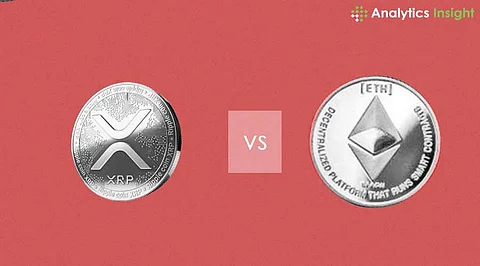

Ethereum (ETH) and XRP stand as prominent cryptocurrencies, each offering unique value propositions and investment potentials. As of March 21, 2025, Ethereum trades at approximately $1,971.55, reflecting a slight decrease of 2.35% from the previous close. The day's trading range fluctuated between a low of $1,950.29 and a high of $2,021.67. In contrast, XRP is priced at $2.41, marking a 1.63% decline from the prior close, with intraday movements between $2.40 and $2.52.
Ethereum serves as a decentralized platform enabling developers to build and deploy smart contracts and decentralized applications (dApps). Its versatility has positioned it as the backbone of decentralized finance (DeFi) and non-fungible tokens (NFTs). Historically, Ethereum has demonstrated substantial growth, with average annualized returns of 61.3% from 2017 to 2025.
XRP, developed by Ripple Labs, focuses on facilitating efficient cross-border payments for financial institutions. Its design aims to offer swift, cost-effective international transactions. XRP has also shown impressive performance, with average annualized returns of 58.3% over the same period.
Regulatory Milestones: A significant development for XRP occurred recently when the U.S. Securities and Exchange Commission (SEC) dropped its lawsuit against Ripple Labs. This legal battle, ongoing since 2020, had alleged that Ripple's sales of XRP constituted unregistered securities offerings. The dismissal of this case has removed a substantial cloud over XRP, leading to a price surge of approximately 8%. This resolution not only boosts investor confidence but also paves the way for broader adoption of XRP in traditional financial systems.
Market Adoption and Institutional Interest: Ethereum continues to attract significant institutional interest, particularly with the rise of decentralized finance (DeFi) platforms and the integration of Ethereum-based solutions in various sectors. Its transition to a proof-of-stake consensus mechanism, known as Ethereum 2.0, aims to enhance scalability and energy efficiency, potentially increasing its appeal to environmentally conscious investors.
Technological Advancements: Ethereum's robust ecosystem supports a wide array of applications beyond simple transactions, including decentralized applications (dApps) and non-fungible tokens (NFTs). This versatility contributes to its strong market position and potential for sustained growth.
Network Activity and Investor Behavior: XRP has experienced a remarkable 400% increase in network activity since early March 2025, indicating heightened investor engagement and transaction volume. Whale holdings of XRP have expanded by 10% over the past two months, signaling growing confidence among large investors.
Market Capitalization: Ethereum maintains a substantial lead in market capitalization, currently valued at over $400 billion, whereas XRP's market cap stands around $35 billion. This disparity reflects Ethereum's broader adoption and diverse use cases.
Transaction Speed and Cost: XRP offers faster transaction speeds and lower fees compared to Ethereum, making it more suitable for high-frequency, low-value transactions. Ethereum's network has faced congestion issues, leading to higher transaction costs, although ongoing upgrades aim to mitigate these challenges.
Regulatory Environment: The conclusion of the SEC lawsuit provides XRP with a clearer regulatory standing, potentially enhancing its attractiveness to institutional investors. Ethereum, while not currently facing significant regulatory hurdles, operates in a rapidly evolving legal landscape that could impact its future valuation.
Ethereum: Its extensive ecosystem, encompassing DeFi, NFTs, and dApps, offers multiple revenue streams and growth avenues. The transition to Ethereum 2.0 is expected to improve scalability and reduce energy consumption, potentially attracting a broader investor base. However, competition from other smart contract platforms and regulatory developments could influence its ROI.
XRP: The resolution of legal uncertainties enhances XRP's potential for integration into mainstream financial systems. Its focus on cross-border payments aligns with the increasing demand for efficient international transaction solutions. Nonetheless, its reliance on partnerships with traditional financial institutions may limit its decentralization, a factor that some investors consider crucial.
Some analysts predict that XRP could surpass Ethereum in market capitalization if current growth trajectories continue. Others caution that Ethereum's diverse applications and established infrastructure provide it with a competitive edge that may sustain its market dominance.
Both Ethereum and XRP present compelling investment opportunities, each with distinct advantages and risks. Ethereum's comprehensive ecosystem and ongoing technological advancements position it for sustained growth, while XRP's recent legal clarity and focus on cross-border payments offer a unique value proposition. Investors should consider their risk tolerance, investment horizon, and the specific use cases of each cryptocurrency when evaluating potential returns.
